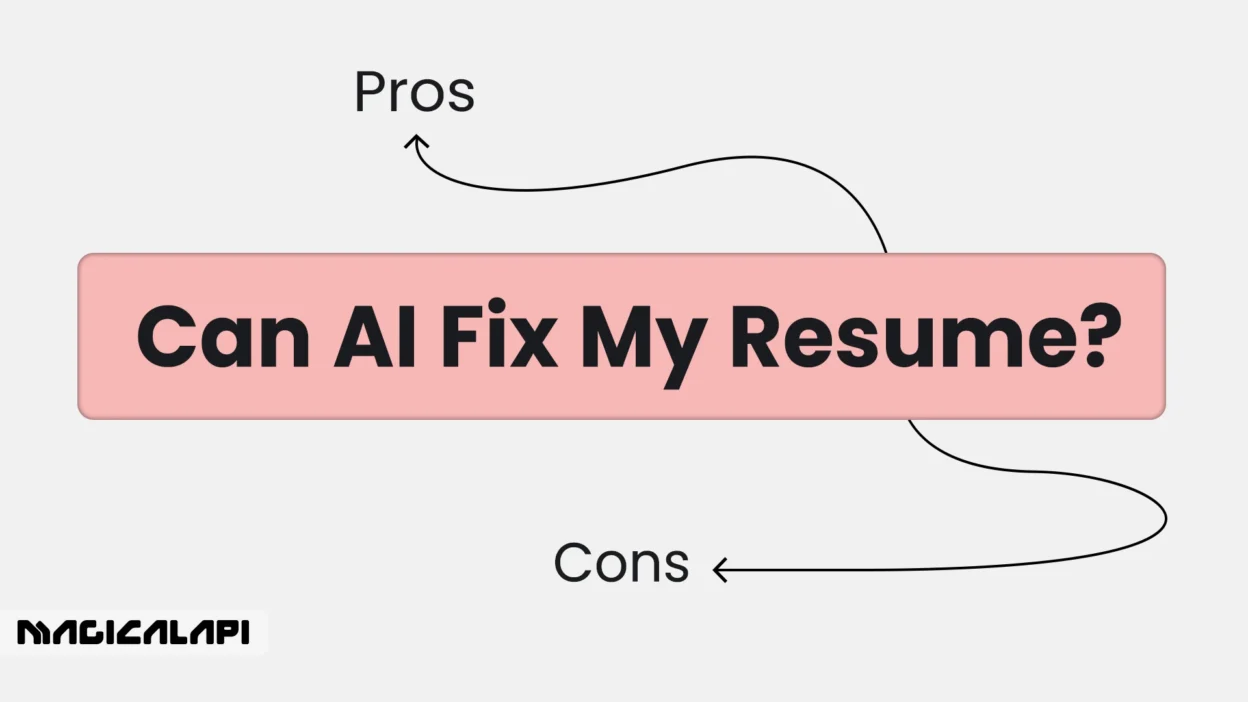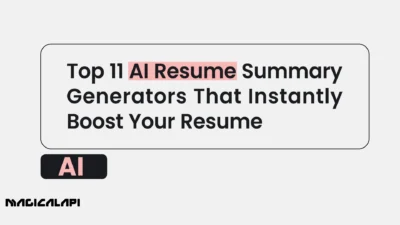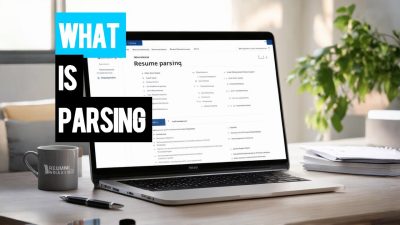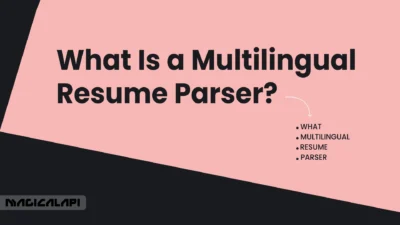Job hunting these days seems to be a different beast than it was just a few years ago. You’re not just writing for a hiring manager anymore; you’re often writing for a robot first. With all the applicant tracking systems (ATS) as the first line of defense, it’s easy to see why job hunters are turning to a new friend: Artificial Intelligence. The idea is enticing.
Just upload your resume, and an AI tool will improve your resume into something guaranteed to get you an interview. But is it that easy? This brings us to the essential question for any job seeker in 2025: Can AI fix my resume in a way that matters?
There is now a wave of AI-powered resume builders, checkers, and optimizers in the job market, each claiming to be the answer to maximizing your career potential. The instant feedback, keyword suggestions, and format corrections can be appealing. As we continue to rely on technology, it is important to consider what it will not do.
Will an algorithm understand the nuance of your career shift? Will it convey your enthusiasm for achievements? This post aims to present a realistic and thorough view of the positives and negatives of AI-assisted resume fixes so you can consider if this is an option for your job search.
Table of Contents
What Does AI Really Do to Your Resume? A Transparent Breakdown
Before entrusting your career trajectory to an AI, it’s important to understand what is happening behind the scenes. Once you upload your document to an AI resume service, it is no longer just about proofreading your document for typos. The technology is conducting a multipronged analysis to make your resume more attractive to algorithms as well as humans.
Of course, it’s important to remember that AI’s strong suit is with ATS compatibility. An Applicant Tracking System is the software that recruiters use to screen candidates. If your resume is formatted poorly (fonts are incorrect, or columns and headers are wrong), the ATS simply won’t allow your resume to be read, which means it’s just as good as lost.
AI tools will search your resume and identify structural problems and provide suggestions to mitigate these issues to ensure it is as legible as possible. Many job seekers could absolutely benefit from doing this as part of their process because they simply overlook this step.
Next, the AI runs a content analysis of your resume based on keywords. In this case, it will compare your resume to the job description you’ve targeted, scanning the document for key skills, qualifications, and industry jargon that you may have overlooked. The AI then recommends where to best place these keywords for maximum match rate. This is one of the main functions of any good AI Resume Optimization tool.
In addition to looking at keywords, these platforms analyze your language. They check for action verbs, the quantification of your achievements, the overall clarity and effectiveness of your bullet points – in essence, they want you to be concise and impactful in how you present your experience on your resume.
For instance, an AI might change the verb “Managed” to “Led and supported a team of 5 marketing specialists to enhance lead generation by 15% in Q3”. So it is nice to take a passive name and turn it into “I did/achieved this”.
Finally, many tools will also provide an overall review and condense the insights into a report or score, similar to a Resume Checker.
Magical Resume Checker
Discover the full potential of the Magical Resume Checker and explore the various options available to enhance your resume, optimize it for applicant tracking systems (ATS), and improve your chances of landing your dream job.
Pros of Using AI to Fix Your Resume: Speed, Structure, and Strategy
“Can ai review my resume?”
This is a question that many people ask!
AI’s greatest benefit for fixing your resume is speed. In fact, while you’re brewing a cup of coffee, an AI will generate a detailed analysis of your resume that would take a human reviewer hours to do. For job seekers applying to multiple positions, this range of efficiency is unsurpassed. You can adjust dozens of resumes in one afternoon when you would have otherwise spent hours drudging through documents and documents.
AI is also very good at structure. Many professionals, particularly those who haven’t updated their resumes in 10+ years, frankly do not know anything about formatting or structure in the current market.
Sure, you could pay a consultant to design it for you, but good AI — like that found in the Best Resume Builder Apps, will enforce style best practices. If you have a clean, professional, and quick resume for a recruiter to scan during the valuable few seconds they devote to application submissions, it will help make the decision to hire you easier. There is no need to debate about font types, border margins, or the order of your sections; the Best Resume Builder Apps leave all of that up to AI.
Ultimately, what we want is the strategic advantage that only AI can provide. Your friends and family may say your resume looks “good,” but they probably don’t know what an ATS or recruiter is actually looking for. AI can assess your document against thousands of successful resumes, as well as specific job descriptions, and can provide recommendations based on data.
It can identify skill deficits of which you may not even be aware, and it can even show you where you can more closely align your experience with the role requirements. Fairly early in their job search process, many job seekers may look for “fix my resume ai free” to gain access to these strategic advantages at no initial cost, and there are a number of reputable free tools to do just that.
Read More: Resume Red Flags
The Hidden Downsides: When AI Misses the Human Touch
While AI can be good at assessing your skills and providing a list of likely resume items for the next employer, it is still not a magic bullet. Its biggest disadvantage is relying on patterns and keywords, which is not the same as context and nuance, what makes your career narrative special. An AI can’t understand the “why” behind your career choices. It won’t recognize the leap of faith it took to change industries, or your unique combination of strengths from a non-traditional experience.
It will try to fit you into an outline and call it complete. This sometimes leads to dull formularized phrases instead of nuanced description. After the AI demolishes the resume with terms like “results-oriented professional” or “proven track record,” you don’t have a difference with another person if they used the same AI to optimize the same job description. A human writer will take you as a professional and make an authentic connection between the individual and profession as the tell a story an AI cannot.
In addition, AI can be incorrect: it may simply misinterpret jargon used only in your industry, or not realize the importance of skills hierarchy in a specialized profession. For those of you in creative fields or highly specialized vocational roles, such as being a graphic designer or a research scientist, an AI may make suggestions that are misleading and unhelpful, with a focus on generic keywords instead of critically important portfolio or publication information for your vocation. This is a very important consideration when you are deciding whether to Use AI for Resume.
Can AI Truly Understand Your Career Story?
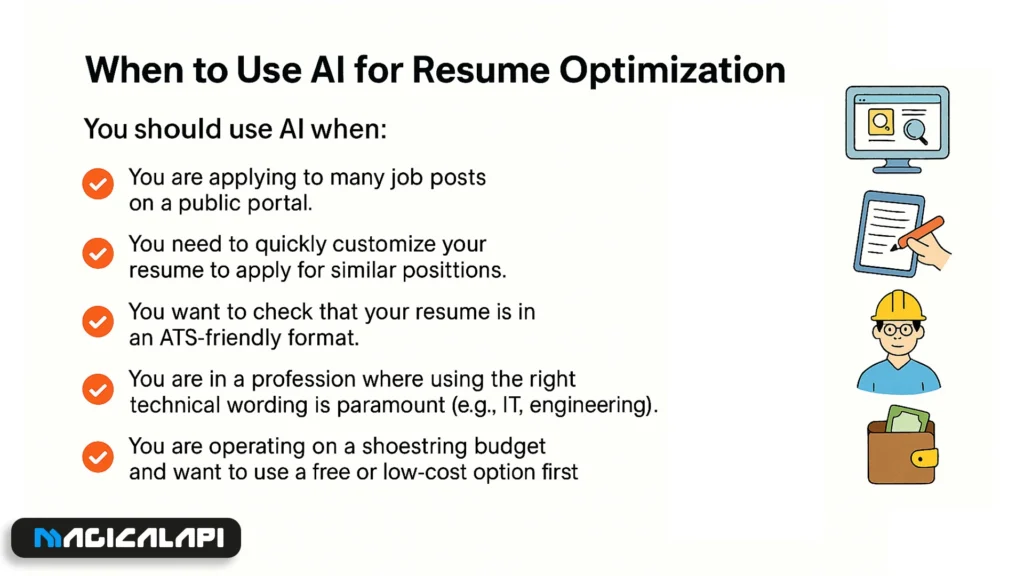
This is maybe the hardest question in this debate. A resume is more than a list of jobs in previous companies with corresponding skills; it is an abbreviated biography of your life as a professional. It should outline a story about how you have grown, learned, and positively impacted others and organizations in your career. For someone with a simple, direct career trajectory, AI can assemble the general story. But what if that isn’t you?
Consider a professional with a five-year gap to raise children, or an entrepreneur who started a company that failed but learned priceless, irrefutable lessons. How does AI classify these “gaps” and “failures”? Usually, it recognizes them as issues and tries to avoid them. AI assesses a gap as a problem to mitigate. It does not appreciate the resilience, vision, risk tolerance, and project management attributes achieved during this period.
An experienced career coach or resume writer may be able to interpret that gap and/or failure with a constructive lens as strengths, and create a narrative that demonstrates you are a fully capable and determined individual.
Similarly, for someone who is making a huge career transition, AI has some difficulty drawing connections. It sees skills from a previous industry but may not be able to see the transference. For example, a former teacher entering corporate training may be an expert in curriculum development, public speaking, and stakeholder management.
An AI may miss those connections, while a human could explicitly translate them for the desired role. The question then becomes less about whether AI can “fix” the resume, and more about whether AI can “represent” the individual accurately.
Read More : Resume Checklist
From Keywords to Career Goals: How AI Can Help You Aim Higher
While AI will undoubtedly struggle with the story of your past, it may be surprisingly adept at helping you create your future story. Rather than just being keyword-matching engines, advanced AI tools move to being career strategists. By linking your skills and jobs you are interested in, some tools can determine the significant skill gaps you will need to address to attain some roles.
As an example, if you are a marketing manager wanting to be a Director, an AI might review 50 Director of Marketing job ads and discover that you are missing a key component that 80% of the ads had in common: experience with a specific analytics platform, like Tableau, which was not referenced in your resume. That is truly valuable insight.
It elevates the role of the AI from an editing process into a professional development coach. It indicates to you the next step you can take, based on your resume, to reach your desired role, and it is data driven. This is ownership. This is using AI correctly. Instead of only applying for jobs you are currently qualified for, it is making you qualified for the jobs you want in the future.
AI Resume Fixers vs. Professional Writers: What’s Better for You?
Choosing between an AI tool and a professional resume writer usually comes down to these three factors: your budget, timeline, and how complex your career has been.
AI resume fixers are generally less expensive, many having free basic services or cheap monthly subscriptions. They are instantaneous and provide feedback 24/7. Using an AI resume fixer will usually be the best option for new graduates, new careerists with uncomplicated career histories, or anybody applying to a large volume of similar jobs, who needs quick and frequent modifications.
A professional resume writer can be a sizable investment (sometimes several hundred dollars or more), and it may take longer (this involves a consultation and a couple of drafts). If you are a senior executive or a professional with complexity in your career history (e.g., you are a career changer, freelance, have a gap in employment history), or someone pursuing a highly competitive role (e.g., executive-level position), then it can be worth your investment.
The primary advantage of working with a human writer is that this is a collaborative experience. The writer essentially acts as a coach to help you uncover and articulate how you create unique value in a way that an algorithm could never do by itself. The writer doesn’t simply optimize your resume for keywords, but walks you through the process of crafting your personal brand.
In the end, it doesn’t have to be an either/or scenario. Many smart job seekers employ a hybrid system; they will use an AI tool for the initial structure and keyword optimization, and then work with a human writer to turn the resume into a narrative and add that human touch.
How Accurate Are AI Resume Scores and Should You Trust Them?
Many AI platforms use a Resume Score to gamify the resume-review process. It can be very satisfying to see your score rise from a 65 to a 90 with only a small amount of tweaking. But what does that score mean? These scores tend to represent proprietary scores based on ATS suitability, keyword density, action verbs, and readability.
Magical Resume Score
Discover everything you need to know about Magical Resume Score , how it evaluates your resume, and the various options available to enhance your job application and improve your chances of success.
A higher score will usually signify you have at least touched on all of the essentials, however, you should only regard this as a helpful suggestion. Just because your score is high at 95% it does not mean you have landed the interview, and just because you got a 75% it does not mean you have been eliminated. The algorithm is not scoring you, it is scoring your document. It does not account for name recognition from your last employer, the significance of a significant project you had completed, or the depth of your business relationships.
The best way to think about these scores is as a diagnostic tool, not a final ranking. If you score low, it should tell you that you have foundational problems with formatting or aligning keywords that need to be corrected. Use the feedback to make improvements in your document, but don’t lose sleep over getting a top score of 100. The end result should be a resume that appeals to a human being, not solely to the machine to satisfy an algorithm. It is also useful to appreciate the larger context of AI Resume Screening so you know how your document is going to be processed when it is submitted.
When to Use AI (and When Not To) for Resume Optimization
When should you use the AI assistant? When should you hit pause and chat with a human?
You should use AI when:
- You are applying to many job posts on a public portal.
- You need to quickly customize your resume to apply for similar positions.
- You want to quickly check that your resume is in an ATS-friendly format.
- You are in a profession where using the right technical wording is paramount (e.g., IT, engineering).
- You are operating on a shoestring budget and want to use a free or low-cost option first.
You should avoid AI for:
- You are making a major shift in your career and need to reframe your work history.
- You have a non-traditional career path, freelance experience, or have not held a job for a while.
- You are applying for a senior-level leadership or executive position and the coverage and storytelling about your accomplishments will be nuanced.
- You are in a creative profession, and a standard resume is being accepted more or less; this means the resume will be unique and visually distinct.
- You are networking and handing your resume to a person to the side of the technology; no ATS. You may even be asking, “Should I Opt Out of AI Resume Screening” this is a different unknowing question to ponder.
Should You Trust AI to Fix Your Resume in 2025?
As we head towards the end of 2025, AI tools are continually getting more sophisticated. These tools can handle more sophisticated contextualization, high-quality, more natural language creation and provide you more nuanced advice on career strategy. In short, the final answer to the question “Can AI fix my resume?” is a qualified yes.
Yes, AI can fix all of the technical and structural parts of your resume incredibly quickly. It’s also great at “optimizing” your resume for the algorithms that sit between you and a real person reading your resume. It can also help you ensure that you are using the terms from the job description when writing the resume. So, it’s no longer just a good idea to use an AI tool to help with your resume, it’s becoming a necessity that will help you navigate the complex, modern, high-volume job market.
You shouldn’t put full confidence in it as the only creator of your career story. The optimal use is a combination. Think of AI as your expert technical assistant. Allow it to generate formatting, perform keyword analysis, or compose initial drafts, but after that you (the “person” who has the personal experience, ambition, and personality) have to do the editing. Read it aloud. Does it still sound like you? Does it reflect what you bring to the table? Put your voice, story, and humanity into it. The combination of machine-using optimization and human-centric storytelling is what will make your resume stand off and land an interview.
Conclusion: Can AI Fix My Resume
As we become more accustomed to AI being a part of the job application process, we will be empowered by the opportunity, but we must also be mindful of the pitfalls. While on the one hand, AI resume tools have the potential to democratize access to resume-building best practices and provide speed, objectivity, and keyword alignment capabilities previously only available by way of costly professional services, these tools are incredibly helpful to make sure your resume at least gets past the first hurdle of AI Resume Screening.
However, while we see over-reliance on these tools produces countless generic, predictable, and soulless documents that don’t convey your unique career story, and fail to take context and nuance into account, OR tell a compelling story altogether. The answer to the question “Can AI fix my resume?” isn’t a simple yes or no. AI can greatly improve your resume without a doubt, but it cannot make your resume perfect.
The best job seekers in 2025 will be the ones who have been able to incorporate AI into their process and be able to work with AI as a tool to manage the technical side of putting a resume together, while being able to weave a compelling and authentic story representation that no algorithm could tell.
Frequently Asked Questions
1. Will AI be able to evaluate my resume?
Yes! This is one of the major purposes of AI-based resume tools. When AI evaluates your resume, it will generally evaluate it by determining if your resume is ATS compliant, look for keywords that match a target job description, measure your use of action verbs and quantification, evaluate formatting and/or grammar. AI will also automatically provide you with instant feedback based on data, so you can make meaningful modifications to your document.
2. Is it cheating and unfair to use AI to develop my resume instead of just writing it myself?
No, it is not cheating. Using AI to help you write or modify your resume is like using a spell checker, grammar checker like Grammarly, or thesaurus. AI is a tool to help you present your qualifications in the best way possible. Recruiters and hiring managers will expect you to use any and all resources available to you to come up with a professional application. While the content and experiences belong to you, the AI would simply help you to frame them in a better manner.
3. What is the best AI tool for fixing a resume?
The “best” option really depends on your needs and budget. Some of the most well-known and recommended options include Jobscan (which helps you add or optimize keywords against a specific job), Teal (the all-in-one job search management tool), and Kickresume (which has user-friendly templates and an AI writer). Many options offer a “fix my resume ai free” scan which is a great way to test them out before diving into a subscription.
4. Can AI help me tailor my resume to each job application?
Absolutely, this is one of the best uses of AI in the job search. Jobscan allows you to paste your job description and your resume side-by-side. The AI analyzes in seconds how well you match the role and gives specific suggestions for keywords and skills to add for tailoring a resume. This expands the tailing process and makes it much faster and more effective.
5. Will an AI-written resume read too robotic?
This is a fair point. Earlier AI writers could produce generic and robotic-sounding content. AI writing technology has developed considerably since. Most forms of AI are quite good at creating professional-sounding text, especially contemporary AI tools. But it is still wise to take the AI’s suggestions as a point of departure. Always reach and edit the suggested text to make sure it reads in your voice and accurately communicates your experiences.


